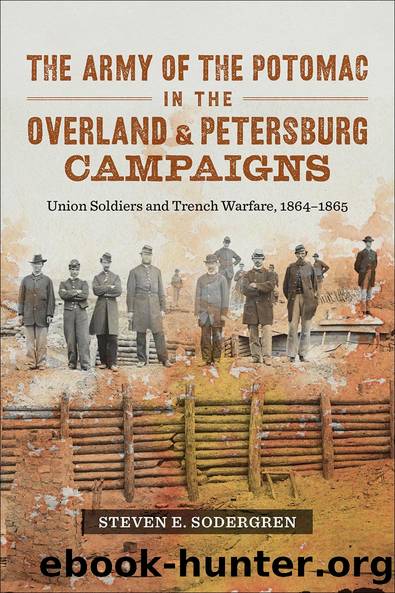The Army of the Potomac in the Overland and Petersburg Campaigns by Steven E. Sodergren

Author:Steven E. Sodergren [Sodergren, Steven E.]
Language: eng
Format: epub
Tags: History, United States, Civil War Period (1850-1877), Military, Strategy
ISBN: 9780807165584
Google: tsbLDgAAQBAJ
Publisher: LSU Press
Published: 2017-06-05T00:29:38+00:00
7
âThe Warm, Loving Heart of Peaceâ
MAIL AND ESCAPES FROM THE FRONT
A soldier can do without hard bread but not without his letters from home.
âMajor Elisha Hunt Rhodes, 2nd Rhode Island Volunteer Infantry
Private George Chandler arrived late to the war. A ship carpenter from Brooklyn, Chandler enlisted as a private in the 39th New Jersey on September 23, 1864, joining the camps of the 9th Corps at Petersburg soon after. The campaign was still active, however, and shortly after his arrival the 39th was involved in an action near Poplar Grove Church. Chandler survived the engagement physically unscathed, emerging with a newfound respect for African American soldiers who âfought well saving us the honor of being shot at by the Jonnies.â Chandler was not discouraged by his first battle, writing to his uncle in November, âI am not at all tired of soldiering but like it first rate. I keep in fine health & spirits.â1 The following month, things were more sedentary for Chandler as he described the work that was going into their âpermanentâ quarters for the upcoming winter months. âIt would do you good to see the architectural style of our Mansions,â he reported in another letter to his uncle, âwe build up logs about four feet high & put up four tents for a roof & log up one end completely.â The result of these efforts âleaves us about six feet square clear to move around in, but thatâs plenty.â Despite this pride in his wartime home and continued satisfaction with his service in the army, Chandler closed his letter with a lengthy description of a bunkmate who was in a hospital. He claimed with clear dismay that his friend had come down with a case of homesickness and appeared to be suffering greatly from it: âI never saw any one fail so fast before and that with no physical disease.â2 As he wrote these comments on Christmas Day 1864, Chandler no doubt felt a tinge of homesickness himself as the Petersburg campaign stretched endlessly before him.
While a steady source of food and shelter could be a positive source of morale for the army, meeting the physical needs of the men in the trenches was only part of the picture. Union troops needed a distraction from the deadly environment that surrounded them, lest they succumb to the belief that there was no world outside of the trenches and return to the fatalistic perception of their role in the war that followed the Overland campaign. Distractions were few in the trenches, but escapes from the melancholy of life in the field did occur on a frequent basis. This was achieved through connection with the home front, either through a literal escape to the safety of home for the short duration offered by a furlough, or a psychological escape provided by correspondence with loved ones in the North. As demonstrated in the previous chapter, men expected the Northern populace to support them, and part of that expectation was for them to be reminded of what they were fighting for.
Download
This site does not store any files on its server. We only index and link to content provided by other sites. Please contact the content providers to delete copyright contents if any and email us, we'll remove relevant links or contents immediately.
| United States | Abolition |
| Campaigns & Battlefields | Confederacy |
| Naval Operations | Regimental Histories |
| Women |
In Cold Blood by Truman Capote(3378)
The Innovators: How a Group of Hackers, Geniuses, and Geeks Created the Digital Revolution by Walter Isaacson(3165)
Steve Jobs by Walter Isaacson(2890)
All the President's Men by Carl Bernstein & Bob Woodward(2370)
Lonely Planet New York City by Lonely Planet(2218)
And the Band Played On by Randy Shilts(2199)
The Room Where It Happened by John Bolton;(2152)
The Poisoner's Handbook by Deborah Blum(2135)
The Innovators by Walter Isaacson(2098)
The Murder of Marilyn Monroe by Jay Margolis(2095)
Lincoln by David Herbert Donald(1983)
Being George Washington by Beck Glenn(1927)
A Colony in a Nation by Chris Hayes(1927)
Under the Banner of Heaven: A Story of Violent Faith by Jon Krakauer(1797)
Amelia Earhart by Doris L. Rich(1691)
The Unsettlers by Mark Sundeen(1682)
Dirt by Bill Buford(1671)
Birdmen by Lawrence Goldstone(1662)
Zeitoun by Dave Eggers(1644)
